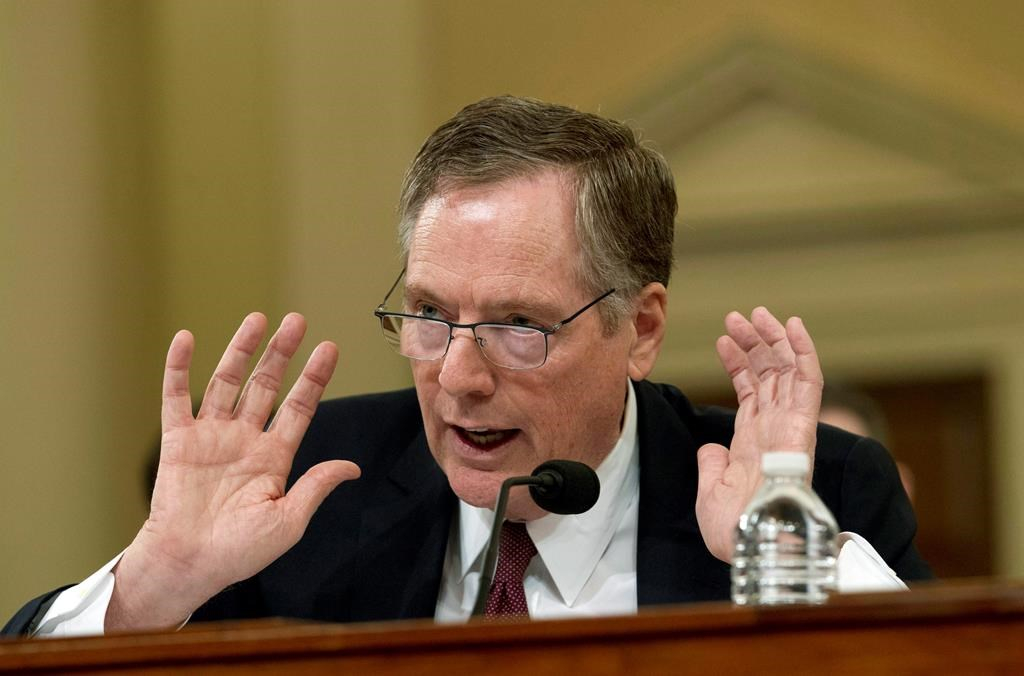Support strong Canadian climate journalism for 2025
The top U.S. trade official says he's optimistic a NAFTA agreement could be reached soon, with all sides racing against the clock to complete negotiations before political uncertainties set in this spring.
The democratic calendar means that a deal must be completed by June in order to allow ratification votes in 2018 — before the current Mexican government leaves office, and before the midterms potentially reconfigure the U.S. Congress.
The Trump administration fears a failure to obtain an agreement within several weeks would mean talks would drag into 2019 and into a more uncertain political environment.
"I'm hopeful (of a deal soon). I think we are making progress. All three parties want to move forward,'' U.S. trade representative Robert Lighthizer told CNBC on Wednesday.
''If there's a real effort made to try to close out and to compromise and to do some of the things we all know we should do, I'm optimistic we can get something done, in principle, in the next little bit."
The Canadian side isn't quite as bullish on prospects for an immediate deal: ''(It would be) a bit of a challenge,'' Canada's chief negotiator, Steve Verheul, said before a meeting with union officials in Ottawa.
''We've got quite a bit of work to do yet, actually.''
The countries are still said to be far apart on key irritants like dairy, dispute-enforcement mechanisms, and Buy American rules.
But the reason for the U.S. hurry is spelled out in its own domestic trade law.
The law sets 195 days for consultations on a new trade agreement before lawmakers can vote. It so happens that the absolute drop-dead date for starting that 195-day clock, before a new Congress takes office on Jan. 3, 2019, is June 21 — the first day of summer.
One trade expert says the practical deadline is actually even earlier.
According to Dan Ujczo of the firm Dickinson Wright, the real deadline is mid-May. That would allow time for a pause before the Mexican election July 1, leave room for procedural snags, and permit a vote before Congress leaves Washington at Christmas.
Lighthizer alluded to the political pressure: ''We have a short window because of elections and things beyond our control.''
In an effort to get that deal, the U.S. appears to have backed away from one of its most contentious demands and is no longer insisting that 50 per cent of cars be made in the U.S., and is now floating a different formula based on autoworker salaries.
Several sources say the U.S. has shaken up the talks with a new proposal on autos.
In the early rounds, the Americans angered the other countries with a two-pronged proposal: on the one hand, drastically increasing the percentage of North American parts a car must have to avoid a tariff, while on the other hand insisting that half the parts be American. Other countries called that a non-starter.
Now, according to sources familiar with the latest developments, the U.S. has offered to replace the 50-per-cent requirement with another idea designed to encourage American manufacturing: a formula that credits car companies for paying more than $15 per hour.
That would, by definition, favour manufacturing in the northern part of the continent — because Mexican auto-workers' wages average only a few dollars per hour.
Lighthizer has also said he's seeking policies that lift Mexican wages to discourage cheap-labour outsourcing; he has mentioned, as one example, reforms to collective-bargaining procedures.
But one analyst cites reasons for skepticism.
Jeff Rubin, a senior fellow at the Centre for International Governance Innovation and former chief economist at CIBC World Markets, said the details matter.
For example, some auto companies have warned that if NAFTA rules become too onerous they could just ignore them and pay the 2.5 per cent tariff to operate in the U.S.
Rubin notes that said the $15-an-hour proposal is about three times the salary of an average Mexican auto worker, and it's unclear the proposal will force companies to change behaviour.
''Determining how meaningful this proposal is, or any other domestic content requirement, depends very much on the cost of non-compliance, which at this point remains trivial,'' he said.
He also expressed doubt about the concept of embedding wage standards in a trade agreement: ''It would establish a principle wage norm in free trade agreements, which is certainly outside the spirit of the World Trade Organization.''





Comments